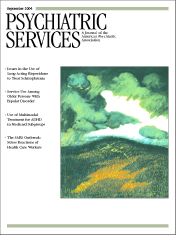To the Editor: In the March 2004 issue, Dr. Citrome and his colleagues (
1) reported on a study in which they conducted a post hoc analysis of a large data set from a multicenter trial to compare the specific antihostility effects of divalproex when it is used alone and in combination with risperidone and olanzapine. The authors found that combination therapy was associated with a modest but statistically significant reduction in the hostility item on the Positive and Negative Symptom Scale (PANSS). Although this effect diminished and was no longer significant after day 7, the authors concluded that adjunctive divalproex "may be a helpful augmentation strategy in reducing hostility."
I would caution clinicians about the inconclusive nature of the findings of this secondary analysis. Psychiatric Services rarely publishes the findings from clinical trials, although it occasionally publishes reviews of such studies. Therefore, I also question the usefulness of the publication of preliminary research in a journal that has such a wide readership among clinicians who treat patients in the public sector.
The Cochrane Collaboration (
2) recently reviewed all the studies of valproate for schizophrenia, including complete data from the primary publication of the multicenter trial (
3) from which Dr. Citrome and his colleagues obtained their data. The Cochrane review emphasized the fact that divalproex had no sustained effect after an initial accelerated response in the four-week study. The review stated that there was "very little evidence to support the use of valproate in schizophrenia." Despite the lack of evidence, the use of valproate and other anticonvulsants has increased substantially, especially in the public sector. The New York State Office of Mental Health reported that 34.9 percent of state hospital patients with a diagnosis of schizophrenia were receiving valproate in 2001, and almost half of all patients were receiving an anticonvulsant (
4).
Post hoc analyses of data are prone to type I errors, such as finding a difference when, in fact, there is no difference (
5). Because of their limitations, such secondary analyses are more often used to generate hypotheses for further trials. When evaluating the usefulness of the findings of clinical trials, clinicians should consider whether the study participants are similar to their own patients, whether outcomes are clinically significant, and whether potential benefits outweigh any involved risks. Participants in the divalproex combination trial presented with an acute exacerbation of schizophrenia with prominent symptoms of hostility or excitement or both. Individuals in state psychiatric hospitals are more likely to have been given valproate or other anticonvulsants for aggressive behavior that is repetitive or persistent, and they are treated with these agents long-term.
Finally, the trial in question did not identify any adverse effects from the addition of divalproex, although the report of the full clinical trial noted that combination therapy with risperidone and olanzapine produced somnolence in 29 and 38 percent of trial participants, respectively. Sedation could also explain some of the effects of the agent, which is an issue that Dr. Citrome and his coauthors do not adequately address.

